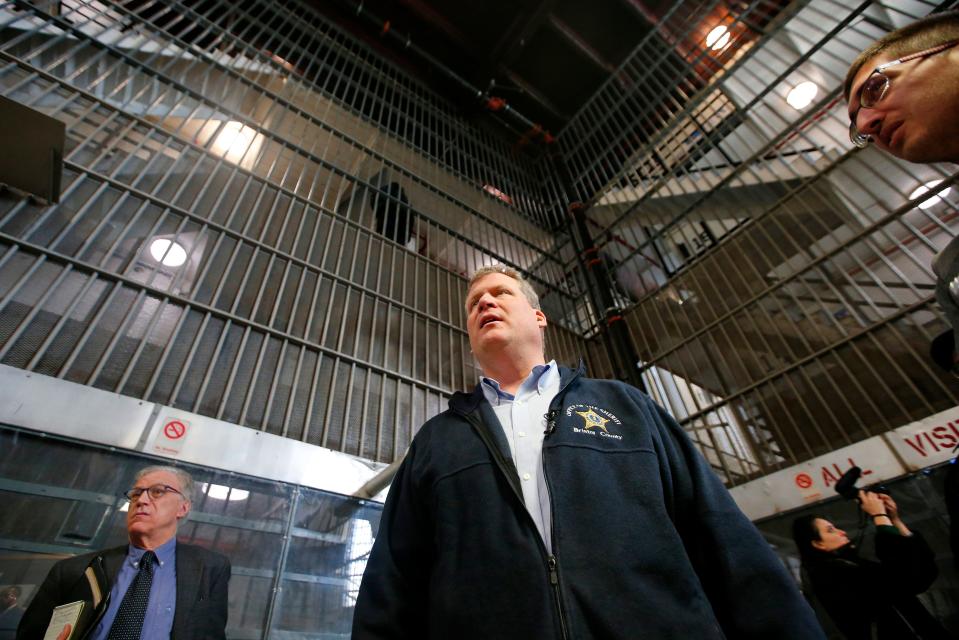Bristol County Sheriff Paul Heroux's first year in office has seen many changes
- Oops!Something went wrong.Please try again later.
DARTMOUTH —The Bristol County Sheriff's Office Training Academy graduated 27 recruits earlier this month.
That's good news, said Sheriff Paul Heroux, who is finishing up a first year in office that has seen many changes.
Heroux said the December class was one of the largest graduating classes in recent years. Twenty-two recruits also graduated from the Academy in June under Heroux.
Heroux said his overall goal is to focus on "corrections," which includes adding to the staff.
He does not want to become involved in illegal immigration and border security issues as did his predecessor, 25-year incumbent Tom Hodgson, who is currently serving as chairman of former President Donald Trump's Massachusetts presidential campaign.
"I will leave illegal immigration and border security to the federal government. We have a border with Rhode Island. I'm not worried about them coming over," Heroux joked.
Readying inmates to re-enter the community
Heroux said corrections is about the inmates "re-entry" into the community.
Most House of Correction inmates are serving 2 1/2 years or less. Pre-trial inmates, though, can be held much longer and typically face longer state prison sentences on more serious charges.
In his first year, Heroux has extended the training academy for new officers from eight weeks to nine weeks.
The curriculum now includes de-escalation tactics, dealing with mental illness, duty to intervene, and implicit bias. He made similar changes with Attleboro police training while he was mayor.
Recruitment and retention initiatives have also been launched to beef up the staff.
The BCSO has implemented a $5,000 bonus for new correctional officers.
Salary increases were also implemented for new COs coming in with an associate's degree or first responder experience. Recruits coming in with a bachelor's degree or four years in the military are also eligible for higher pay.
The BCSO is also implementing regular ceremonies honoring promotions, retirements, and years of service.
"That wasn't previously done," Heroux said.
Recruits didn't want to serve under Hodgson
The BCSO is also being "a lot more aggressive with our recruiting." That includes assigning a captain to recruitment duty and buying Google ads.
Another reason recruitment is up is the change in administration, he said.
"Some people said they didn't want to work for my predecessor," Heroux said.
There are about 260 correctional officers at present. Heroux wants to bring that number up to 350, including officers.
The main reason is safety.
Most housing units are monitored in three shifts, manned by two COs, two COs, and one CO on the overnight 11-7 shift.
"That one CO on third shift is watching 60 to 70 people," Heroux said.
He wants to increase coverage to three COs per the two day shifts and two for the overnight.
"I would like to get our staffing levels up because it's a lot safer for the COs and the inmates," he said.
Heroux said additional staff will also help the BCSO get away from forced overtime to fill personnel gaps. That practice can drive new COs to quit.
More inmates eligible for drug treatment
Among his other first-year changes, Heroux has expanded the Medication Assisted Treatment Program.
In the past, incoming inmates with substance abuse issues had to have a prescription and treatment plan in place.
If not, they were out of luck, Heroux said.
Now all inmates within 120 days or less of their end of sentence can be considered for the MAT program.
"You have to apply, and you have to meet criteria. Then, once you're released into the community, you can continue your treatment," he said.
There are about 100 people enrolled in the MAT program now, Heroux said. It could probably help as many as 350 to 400 of the House of Correction's 700 inmates.
"We will continue to roll it out. We'll build toward that," Heroux said.
Declaring a new mission
Another change brought by Heroux is to the BCSO's mission statement, which now states:
“The Bristol County Sheriff’s Office is a public safety organization committed to care, custody, control, and rehabilitation of inmates. The Bristol County Sheriff’s Office strives to promote a work environment where employees feel valued and have a sense of purpose in their daily work, and will assist other public organizations when needed.”
Why the change?
"I wanted my mission statement to reflect on what I campaigned on, and what my vision is while I'm sheriff."
He's also sticking to his campaign pledge to serve two terms at most.
Heroux has started fundraising for a second term, but is not locked into running yet, he said.
But he definitely won't serve beyond two terms.
"Because eventually I will wear out my welcome, eventually I will have blind spots and they'll need someone else to come in and fill those blind spots," Heroux said.

Providing resources to reduce recidivism
Heroux has also made organizational changes in his first year to reduce recidivism through "strategic discharge planning."
Jodi Hockert-Lotz was hired by Heroux to be the Director of Inmate Services. She worked for the BCSO for nine years before moving to the Mass. Department of Correction, where she worked for the previous eight years.
As part of her duties, she will oversee positions focused on securing housing, healthcare, and employment for inmates being released from jail.
That reduces the risk they'll reoffend, Heroux said. "We need specialists to address each of these post-release needs."
Working under Hockert-Lotz on post-release will be an assistant director, four coordinators in the fields of housing, healthcare, employment, and logistics, and then five to 10 post-release workers under each coordinator.
Changes to 'restrictive housing,' aka, 'the hole'
Hockert-Lotz has also been working on "restrictive housing," which is "basically, the hole, so to speak."
The BCSO has lost lawsuits under the former administration because of its restrictive housing practices.
Inmates being disciplined are now held in special management housing units, and have more access to programs than they did in the past. They still receive reduced recreation time.
The program no longer conforms to the state definition of restrictive housing, he said.
Heroux has also reduced the markup on commissary items by 12%. Items include optional clothing, snacks, and toiletries. It had been a 32% markup.
"We're sitting on $1.7 million that all came from the inmates. We just didn't need the markup to be 32%," Heroux said.
He added, "It's important for people to realize that it's not taxpayer money."
It's a profit made from the inmates, who are getting the money from their families. "A lot of the families are indigent, so we wanted to provide a little bit of relief."
Providing air-conditioning for behavior control
By law, the commissary money must be used on inmate goods.
That turns out to include air conditioning in the housing units, which Heroux plans to install.
And, no, Heroux doesn't consider installing AC as creating a "country club" for inmates.
"Air conditioning in housing units is a behavioral control issue," he said.
Extreme heat can lead to inmates being held for violent behavior to be more easily agitated. "They can be a lot more violent toward each other and toward the correctional officers."
They've documented fewer violent incidents in air-conditioned than non-AC areas.
Heroux added, "When we improve the living conditions for the inmates, we're also improving the work conditions for the officers. The living conditions are the work conditions. They're the exact same thing."
A shift in the use of K-9s
The BCSO's use of K-9s is also shifting to an emphasis on keeping drugs out of the jail, and sniffing out drugs that have been smuggled in.
Heroux said, "One thing I made clear is we're not going to use dogs to intimidate inmates. It's arguably a violation of the Eighth Amendment, cruel and unusual scare tactics with dogs."
Heroux also eliminated the BCSO's comfort dog program for schools.
"I don't think it's our job, our responsibility to go to public schools to comfort students when something happens. We're here to run a jail," Heroux said.

Closing Ash Street Jail by early 2025
Heroux said plans to close the 135-year-old Ash Street Jail in New Bedford are ongoing. He hopes to oversee the closing by early 2025.
It's a change that will save money, he said.
"When we close Ash Street, we're not going to be paying heat, electricity, or water on a 200,000-square-foot building."
They'll first have to install more toilets in cells and locks on doors at the Dartmouth campus.
State law requires locked cells to include toilets. About half the Dartmouth cells don't include toilets at present and, thus, have no locks.
Planning stages: Proposal to close New Bedford's Ash Street Jail now includes two options
Once the cells have been readied in two housing units, Ash Street inmates can be brought over - along with the jail's 40 to 50 correctional officers.
"It's going to help us be a lot more staff rich," he said.
Gov. Maura Healey and the Legislature have been very supportive of closing Ash Street, he added, and the steps that need to be taken.

Lessons learned from inmate standoff in April
Heroux was only about four months into the job when an hours-long inmate standoff in April threatened to become violent.
Over 130 pre-trial inmates led by 20 ringleaders refused to move out of two housing units.
They were being moved so that work making the units more "suicide resistant" could be performed. That included refitting bunk beds to eliminate choke points.
While they were working to de-escalate the situation throughout the day, sheriff's officers from Suffolk, Plymouth, Hampden, Norfolk, and Barnstable counties and officers from the state Dept. of Correction continued to arrive at the Dartmouth campus.
There were about 130 officers on hand when they decided that they were going to have go into the units after about six hours.
The inmates quickly surrendered in the face of the officers' show of force. They had caused $100,000 to $200,000 in damages. There were no major injuries.
Heroux points to the outcome of two variables.
"Number one, nobody got hurt. That was the most important thing. No inmates and no staff got hurt that day. Number two, we never got sued. There has been zero fallout from that."
Contrasts with 2020 riot at ICE facility
That contrasts with the May 1, 2020 riot at the former Bristol County House of Correction Immigrant Detention Center under Hodgson.
In that case, COs responded immediately and utilized dogs.
"Did Tom go in and take back that ICE facility? Yes. But people got hurt and we're being sued for $10 million. There's probably going to be a settlement far greater than the damages."
Heroux said, "His way of doing it, people got hurt and it's more expensive. I stand by the way I navigated that."
He will continue to run the BCSO his way, he said.
"I'm pursuing the policies I feel strongly about: corrections, staffing levels, re-entry."
This article originally appeared on Standard-Times: A year of changes in Bristol County Sheriff's Office under Paul Heroux

